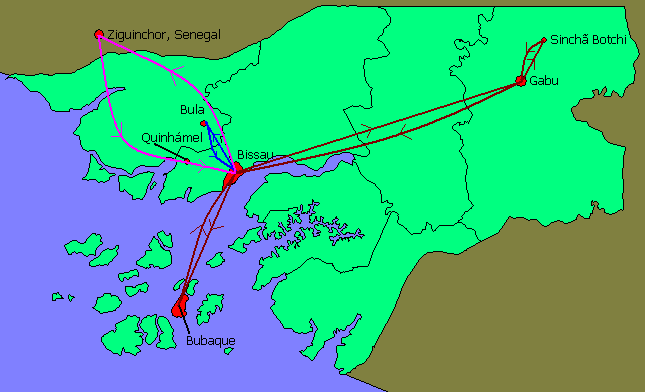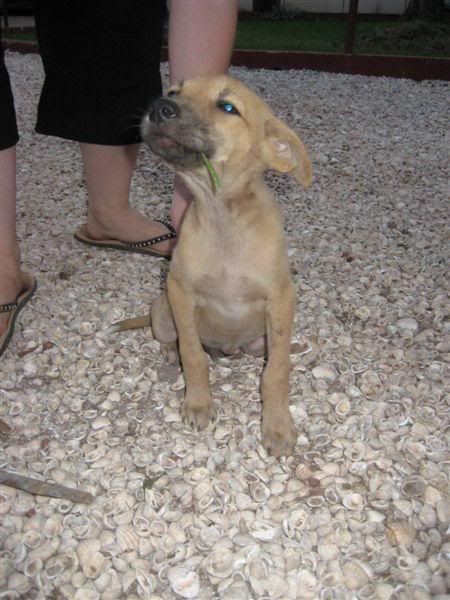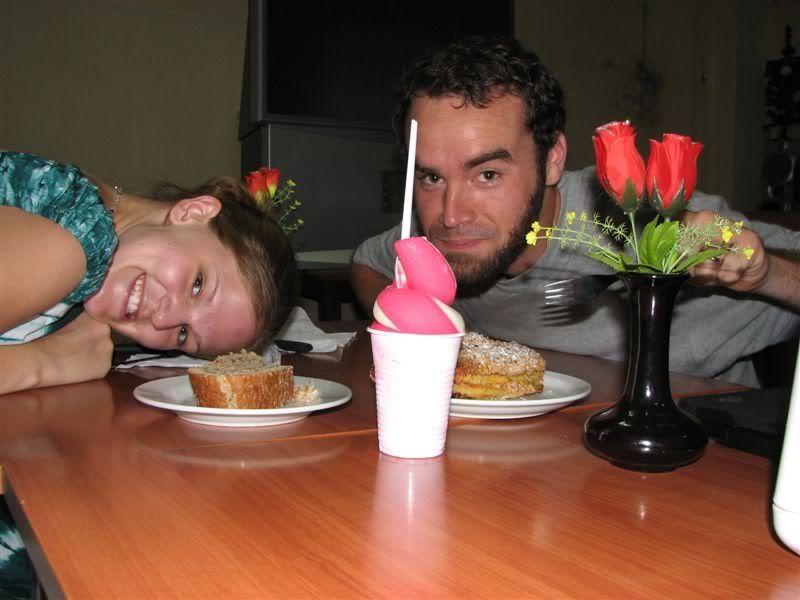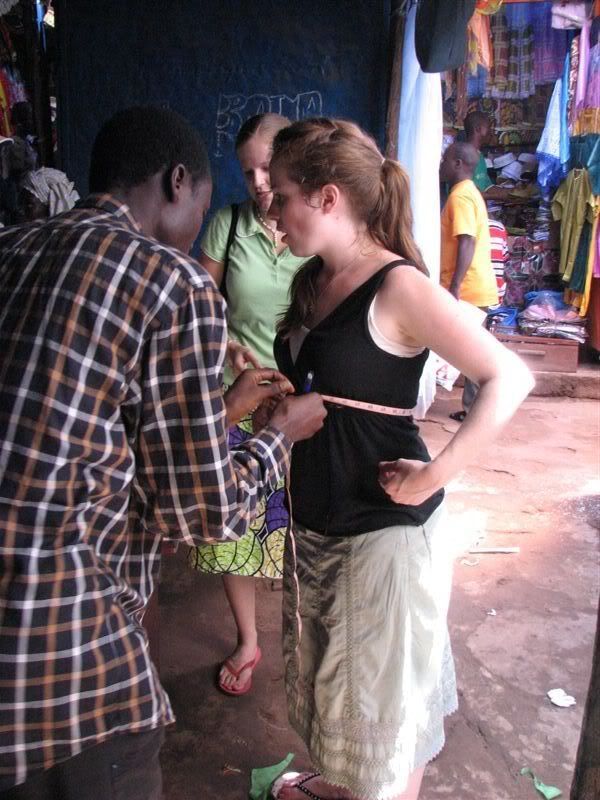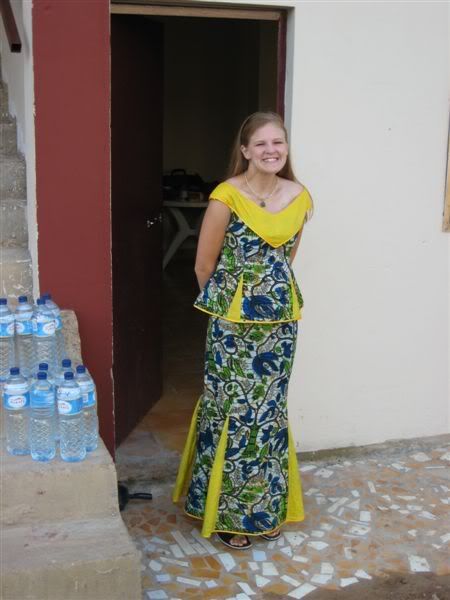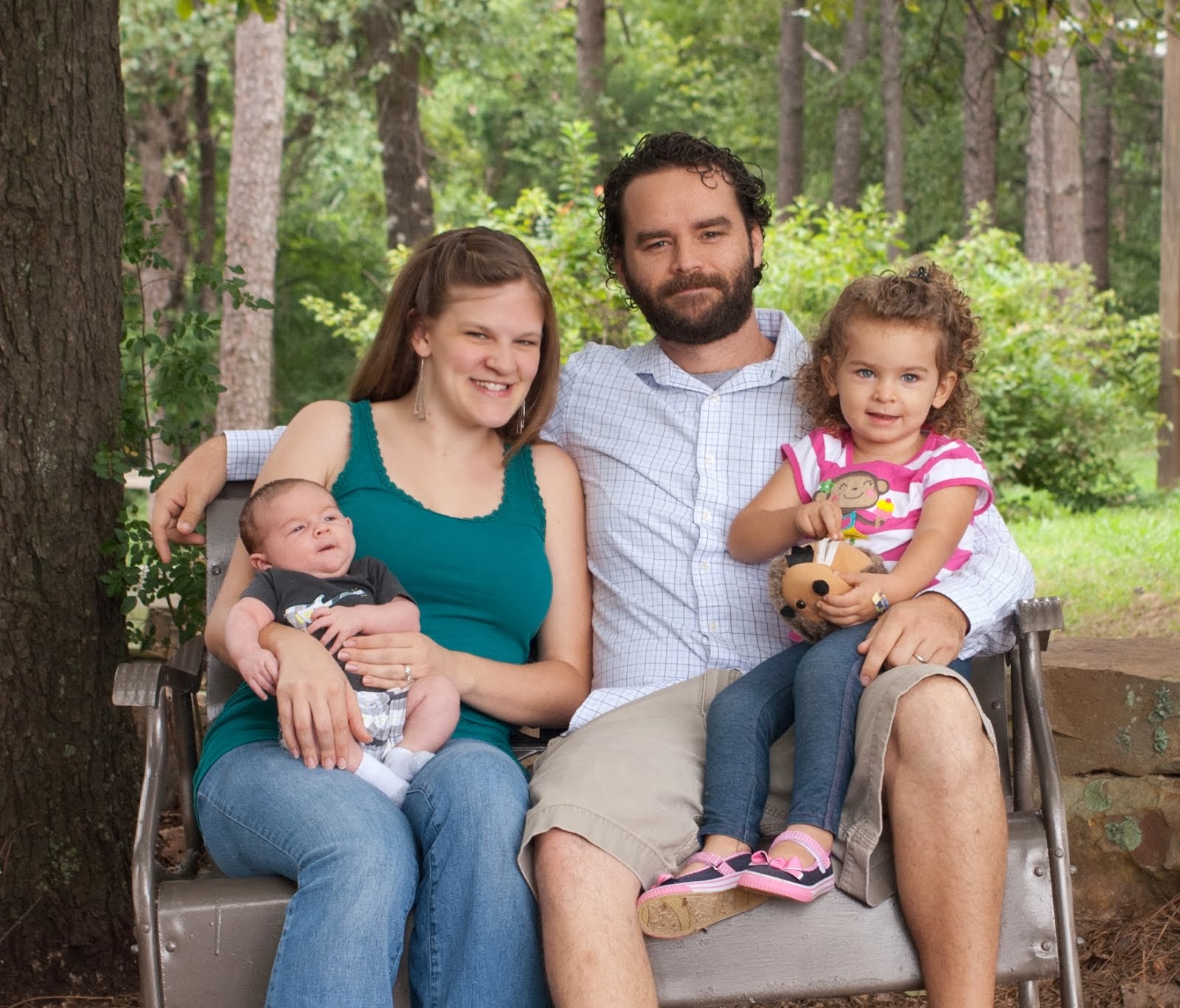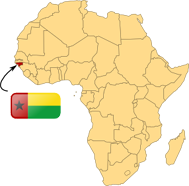We had a great time in Sintchã Botchi! Our hosts were a missionary couple from Brazil – Gilson (pronounced Jill-son) and Rosania – and they were great. We enjoyed lots of different kinds of food (pictures of that to follow) and we learned a lot of new things. I'm pretty sure that my Creole improved a lot as well.
The people in the village were awesome. Sintchã Botchi is a Fula village, and Fulas are a Muslim tribe. All of the people in the village speak Fula and I would say about half can also speak Creole. (If you want to hear someone speaking Fula check out Jason's vlog.) Life is a lot slower in the village than in Bissau (didn't exactly think that was possible before) and it was really nice for a vacation. We did a lot of relaxing and were able to help Gilson and Rosania with their work. Jason did a lot of manual labor with Gilson which was a good change of pace for him.
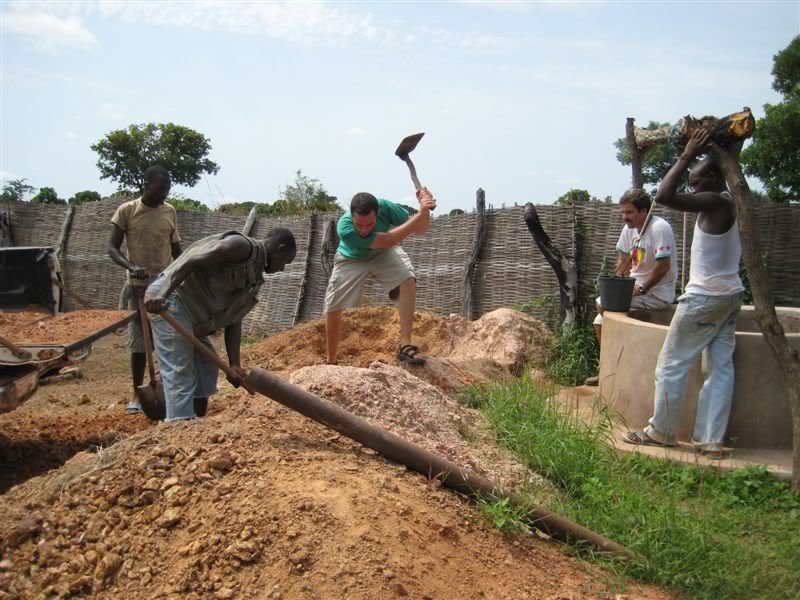
It's funny, I don't really think of Bissau as a big city, but in a lot of ways it is. There is noise here all the time – radios squawking through blown out speakers, roosters crowing at all hours, cars honking, pigs squealing, people yelling, drums banging, things getting pounded, smashed, chopped, etc. I don't usually notice it much, but when we went to Sintchã Botchi I kept noticing that it was strangely silent. No radios, no yelling people, and absolutely no traffic. It was nice. They do have a lot of donkeys there which is funny because there are none in Bissau. I definitely appreciate the lack of donkeys here – those things can be really annoying when they want to! Many things about the scenery were different from Bissau also.
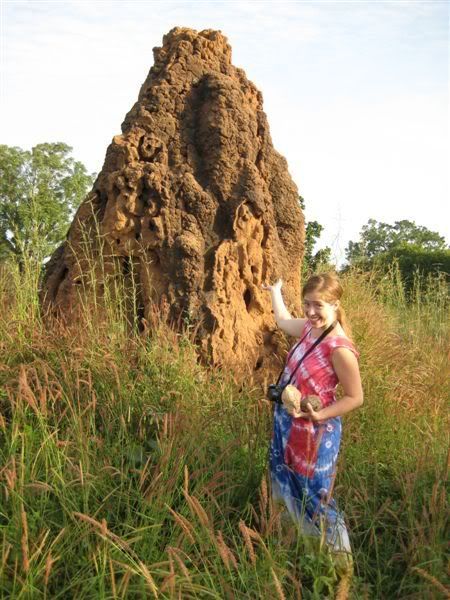
This is a termite mound. It's amazing that something so little can make something so big! These things are all over the place out in the villages.
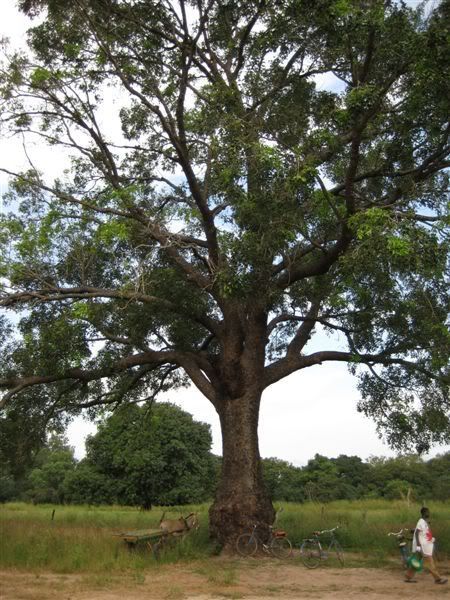
We saw tons of really sweet, old trees like this one.
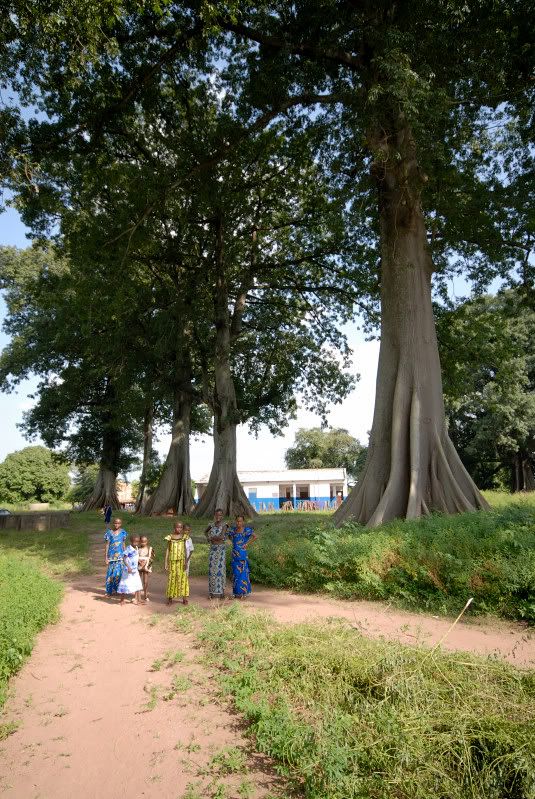
These were so amazing!
We took a sete-plus to Gabu, which is a modified station wagon that goes between different towns, and then Gilson picked us up and took us to Sintchã Botchi. We got there fine and we were having a great time.
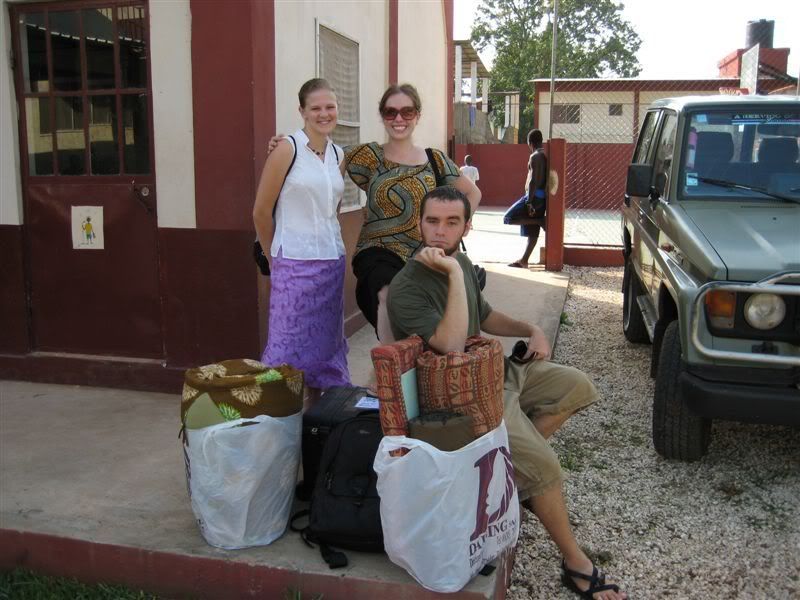
Before we left.
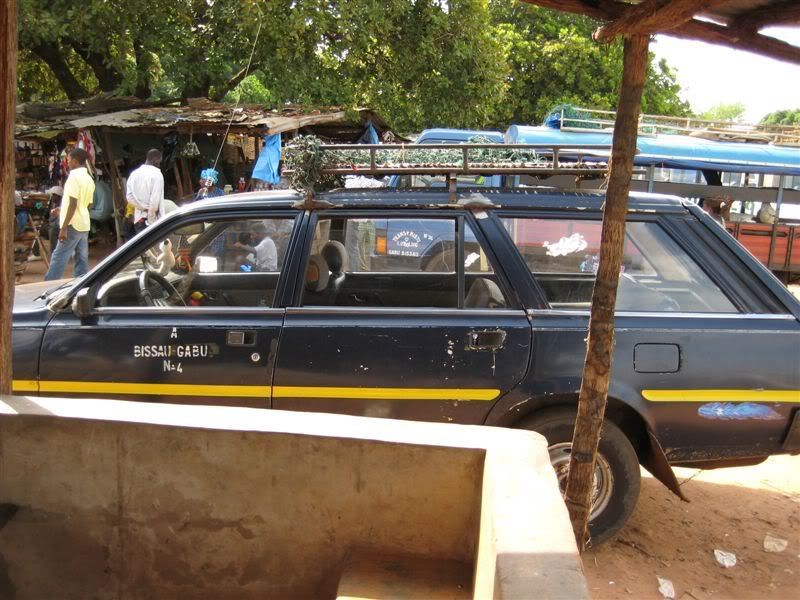
This is at the place were you go to get the sete-plus to Gabu. Yes, that station wagon does have three rows of seats.
Well it wouldn't be a story about Guinea-Bissau if something didn't go differently than we planned, so before I tell you all about the village, let me tell you about that part. We left to go on Saturday and we were planning on coming back on Wednesday. You have to pay for your luggage according to its size so I was trying to go light. I did pack enough underwear and allergy medicine to last until the next Saturday though, just in case. On Monday Rosania asked us if we would stay until Thursday because they were thinking about going to Bissau on Thursday and we could ride together. Erica didn't want to because she had scheduled class for Thursday and Friday, so we said no. On Tuesday we discovered that all of the sete-plus and candonga (a big minivan with bench seats all around the inside that goes between different towns) drivers had decided to go on a strike for three days (Wed, Thurs, Fri); meaning, that we had no way to get back to Bissau. The strike was a protest against the police because they make the drivers stop all the time and pay "taxes" but that money does not go towards helping improve the roads, etc (most of the time the police just keep it). That same day Gilson and Rosania decided that they couldn't leave on Thursday because they had more work to do, so they were going to head to Bissau on Saturday. So, our trip was lengthened. Ironically, the drivers realized on Wednesday that they needed money so they tried to call off the strike, but the police were pretty ticked that the drivers had tried to defy them so they said that if they caught any sete-pluses or candongas on the road before Sunday they would take the driver's papers (license, registration, etc.) haha. I should have learned to always bring double of everything that I think I will need when I travel here... Maybe next time :)
Rosania is an OBGYN nurse and she and Gilson run a little clinic in Sintchã Botchi. They have some exam rooms, a storage area, and a pharmacy. It really is quite nice. The clinic is open in the mornings and most days Erica and I went with Rosania to work. She did exams and we organized the filing system. People come to the clinic with all kinds of problems. Rosania has been talking to the women in the village for years about the importance of monthly check ups while they are pregnant, but often they don't come in unless they have a problem. The women in the villages all work so hard and I think it is more common for them to loose a baby than to actually have one. Out of all of the pregnant women who came in while we were there I don't think that any of them hadn't miscarried. I kept hearing Rosania say, "I'm sorry, you lost your baby." They didn't really react a lot to the news. I think that most of the time they already knew. For example, one lady had noticed a week or so before that her stomach had started to shrink and then had been bleeding for four days before she came in.
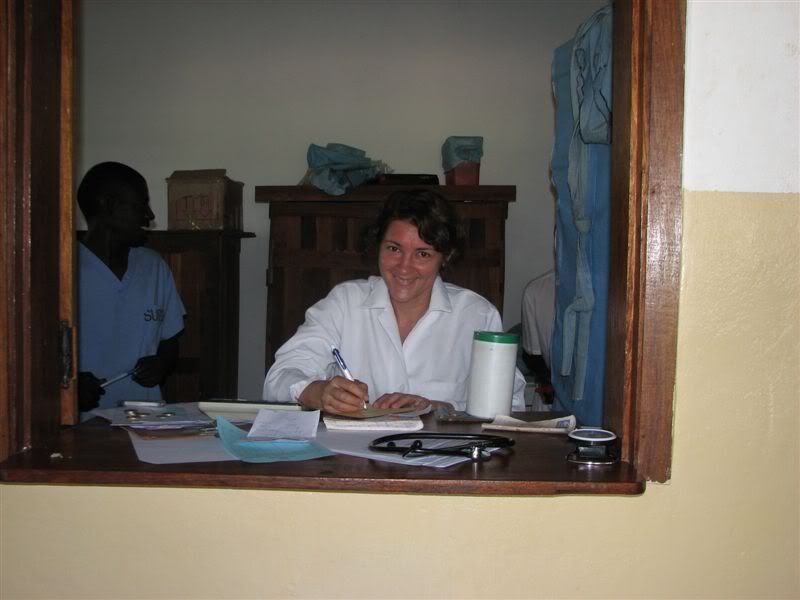
This is Rosania waiting at the reception desk.
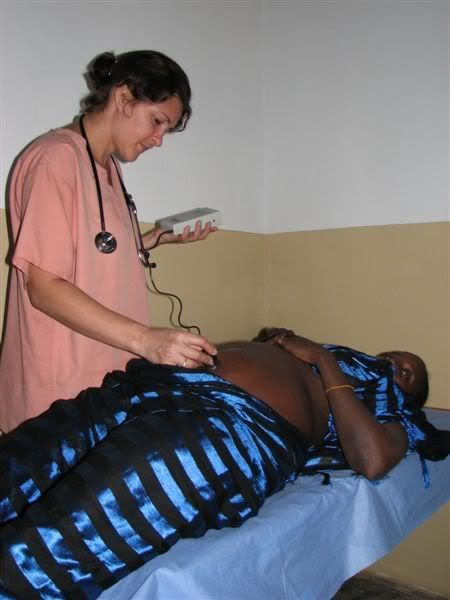
Rosania is performing a sonogram. It doesn't have a picture, only sound to hear the heartbeat
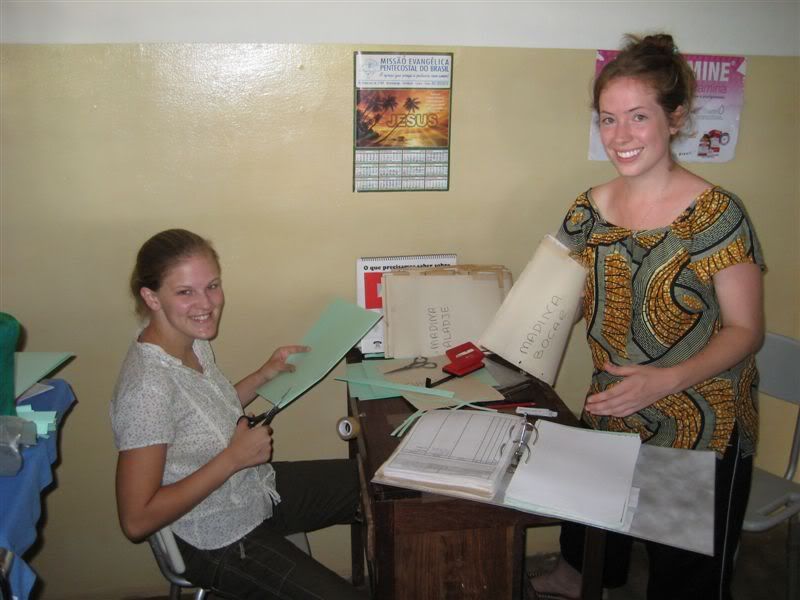
Erica and I organizing files in the clinic.
Rosania has trained several people who work with her in the clinic. They take blood pressure, weigh people, get their files if they have been before, and things like that before Rosania sees them. I actually have a pretty funny story about meeting those guys. The first day that Rosania took us with her to the clinic she was introducing us to all of the staff there and I was trying to make conversation with them. She introduced me to the guy who sells the medicine in the pharmacy, so I greeted him and then asked, "Então, bu bindi drogas li?" which I thought was "So, you sell medicine here, huh?" To which the man responded dramatically "Não, N ka bindi drogas li!!!" ("No I don't sell drugs here!!!") with a horrified look on his face. Turns out that in Creole the word "drogas" (drugs) only means the illegal kind. So basically I was asking him if he was a drug dealer. Rosania was laughing really hard and she explained me that there is a different word for medicine. I apologized and explained that I didn't know it was different and I was not there to purchase drugs... I heard that story being told to patients at the clinic many times throughout the week and every time I saw the guy after that he asked me if I was there to buy some drugs and everyone laughed a lot. I have to admit, it's pretty funny :)
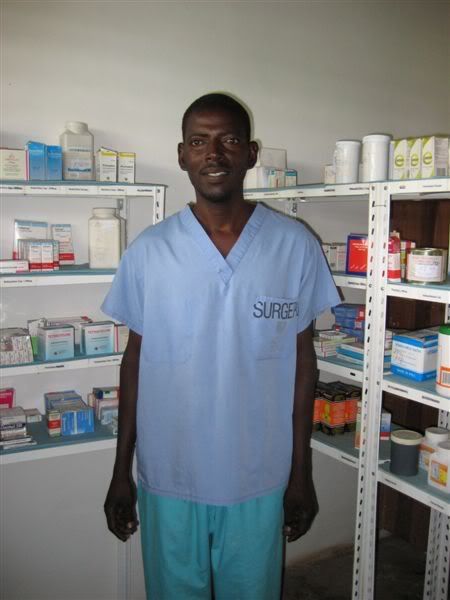
Drug Dealer...
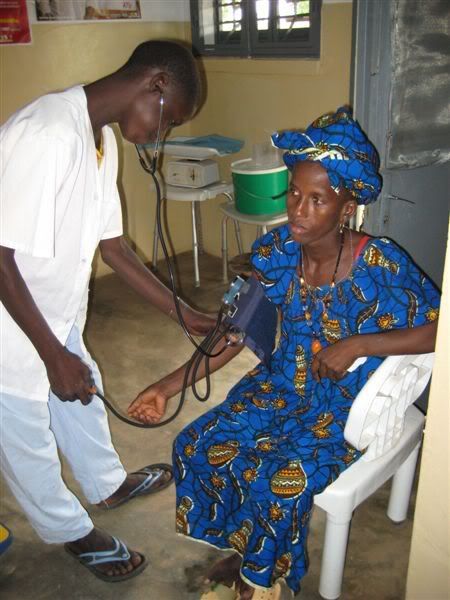
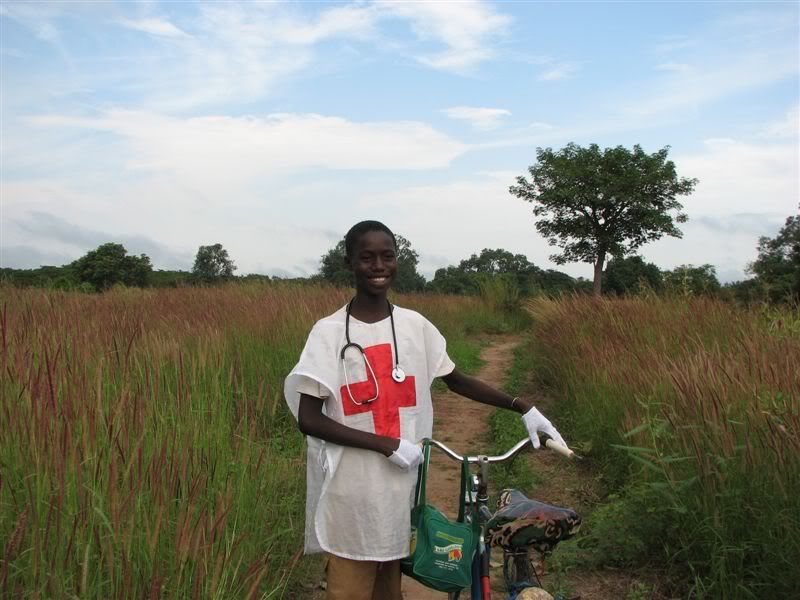
Check out the red cross shirt. Nice :) The people who work in the clinic with Rosania wear scrubs or other medical looking things.
I actually made quite a few mistakes in Creole during the week that were humorous. One time I told Gilson and Rosania that we eat using women (minjers) instead of spoons (kujers). Another time I told someone that a semester at our English school costs 500,000 fcfa ($1000) when I meant to say 15,000 fcfa ($30).
The family life is really sad in Fula villages. All of the Muslim men have more than one wife, sometimes four or five. The husband will have a house and then each of his wives will have their own little round house around his house where they and their children cook and sleep. You have to pay a bride price, so the number of wives you have is a sign of your wealth. All of the girls are "circumcised" at birth so that they won't ever want to sleep with anyone and girls are married around 14 or so because the parents don't want to take the chance that they could get pregnant before they are married and ruin the bride price. On Sunday morning, the first day we were in Sintchã Botchi, Erica and I went with Rosania in the morning to the home of a very sick woman. She was the skinniest woman I have ever seen in my life. It turns out she had AIDS. Rosania gave her an IV and encouraged her to eat, but she died that evening. Jason and Gilson went and took her body to her village in Gilson's truck that night. The saddest thing about this story is that the husband knows that he has HIV and he takes medicine for it, but he doesn't give any medicine to his children or wives. Rosania told me that basically in his eyes they are replaceable. He can always marry someone new and have more kids... Yuck!
In addition to the clinic Gilson and Rosania run a school in Sintchã Botchi. The have grades one through four. It is really good for the children to be able to get an education in their own village because not very many people have the chance to travel to larger villages for school.
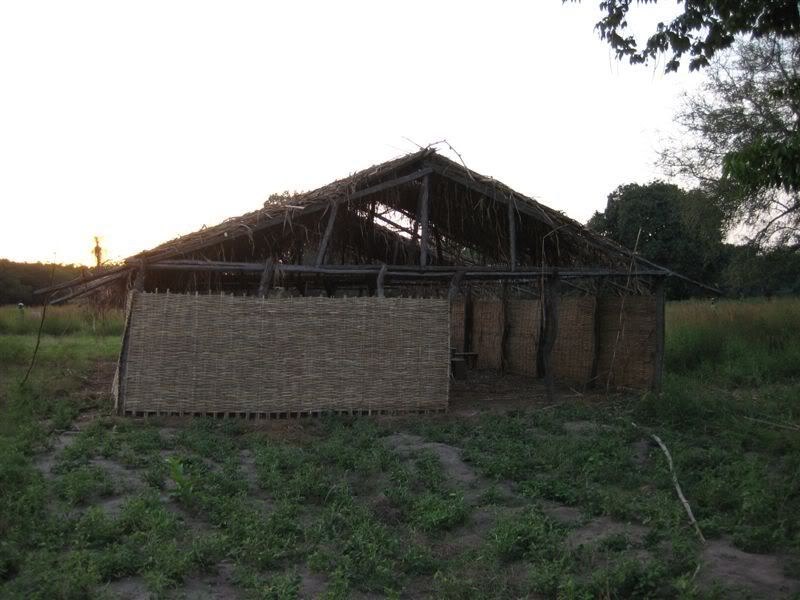
This is the school. There are building another one next to it that is the same. Jase spent most of the week getting stuff ready for it.
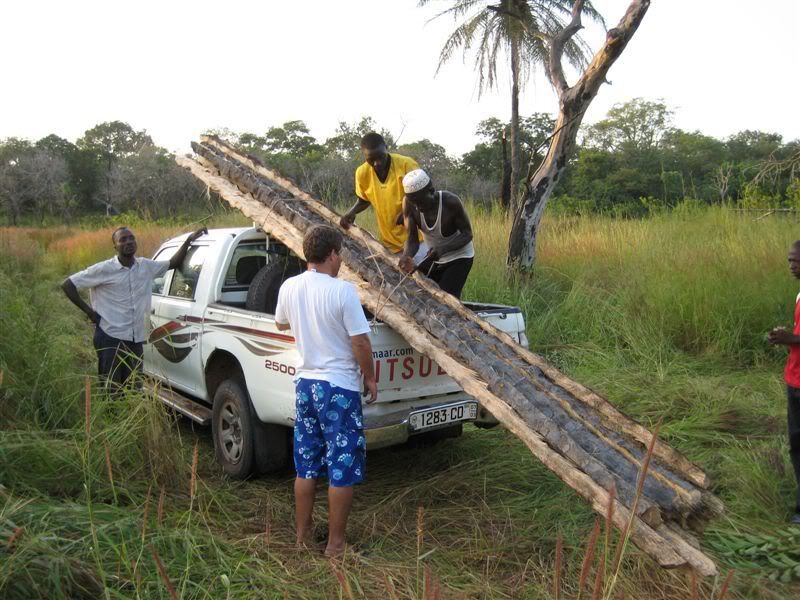
These beams were cut from palm trees to make a roof for the new school building.
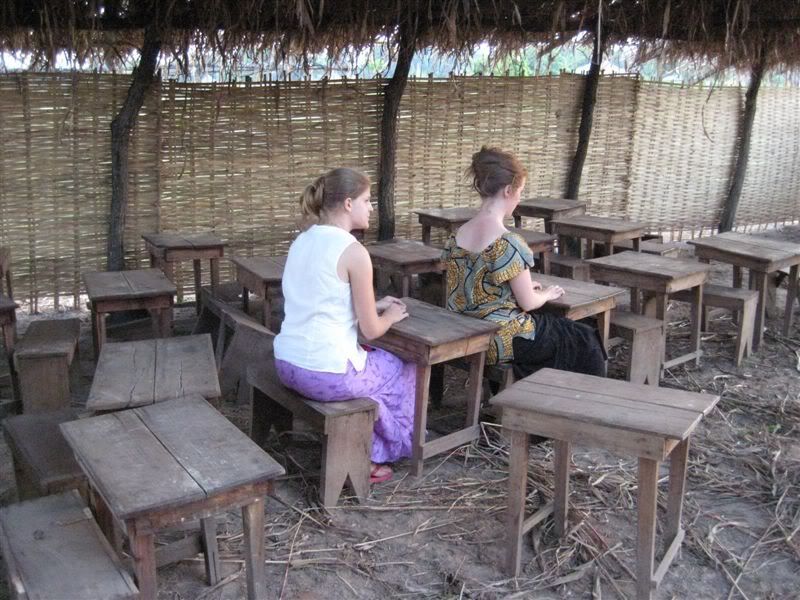
These are the desks inside the school. Model students :)
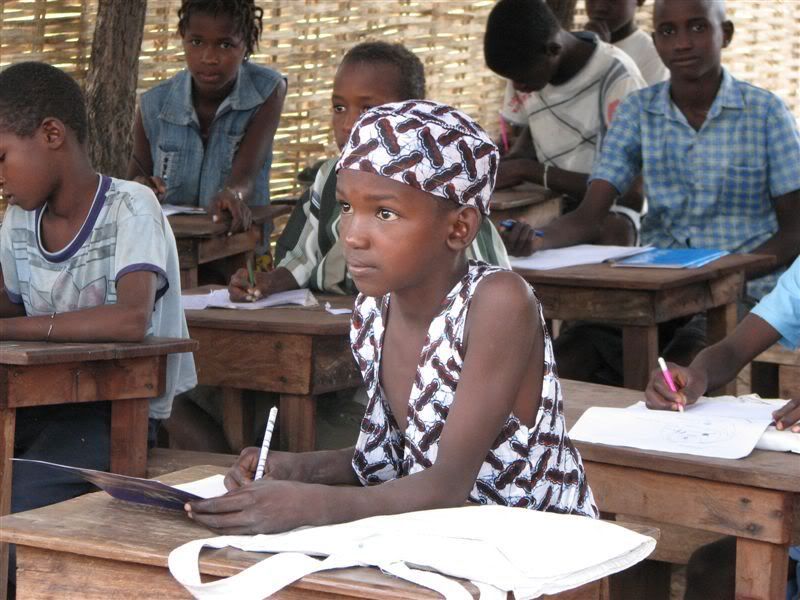
Studying hard.
I promised I would share our cooking adventures with you, so here ya go. One store in Guinea-Bissau got some mozzarella before we left, so we brought some with us; along with some pepperoni we received in the mail, and made pizzas.
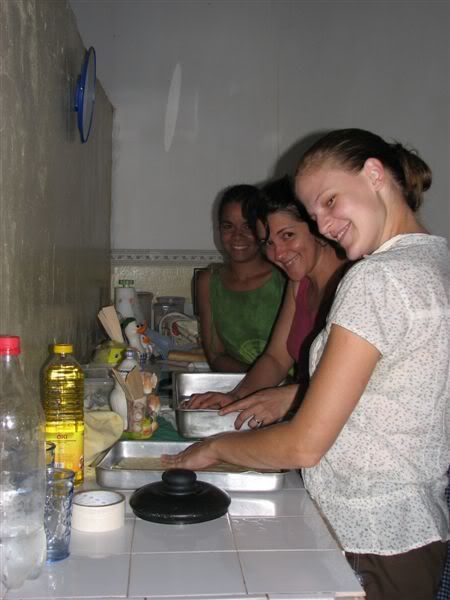
Making the dough
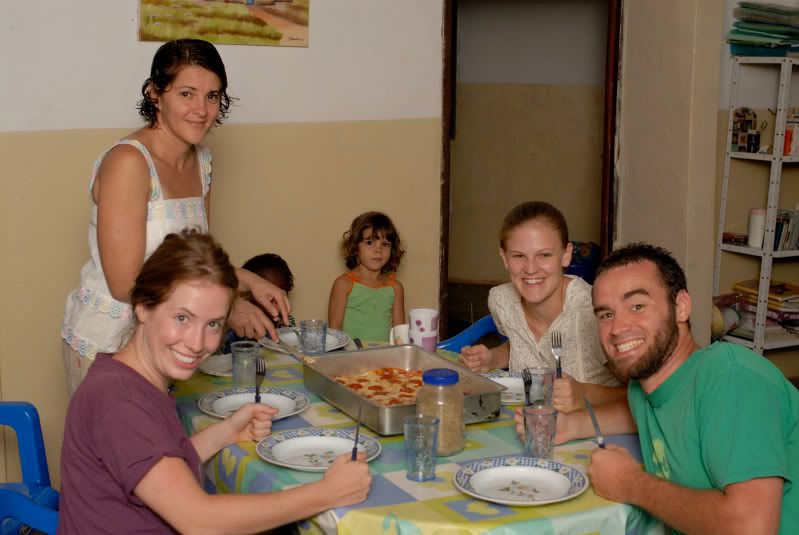
Erica and I had an interesting cooking experience. Gilson slit the throat on a chicken and then handed it to us to make dinner. Neither one of us had ever cooked with anything but meat from the grocery store before, so we smiled at each other and got started. We let the blood run out of it, boiled water and dipped the chicken into the boiling water for a bit to loosen the feathers. Then we plucked it, passed it over the fire to burn the little hairs, and Erica cut off the legs and wings. We didn't know exactly what to do with the innards, so Rosania had to break the chicken open and take them out for us. Then we cooked it and shred the meat. Eating meat really is way too much work here :)
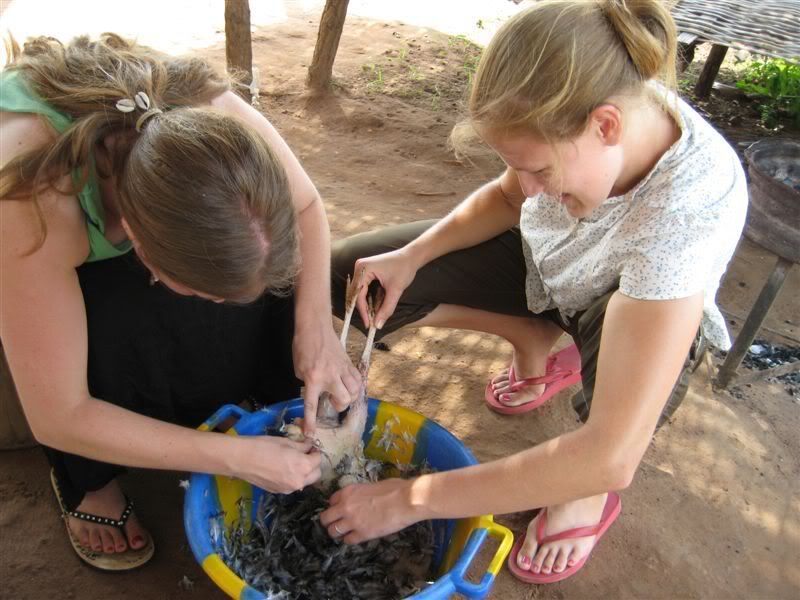
In Bissau everyone has pigs, but in Sintchã Botchi everyone has cows. They slaughter a cow in the middle of the village every day and then people come and buy their meat for that day (a good system in a place without refrigerators). We got to witness this event one day, so I thought I would share it with you.
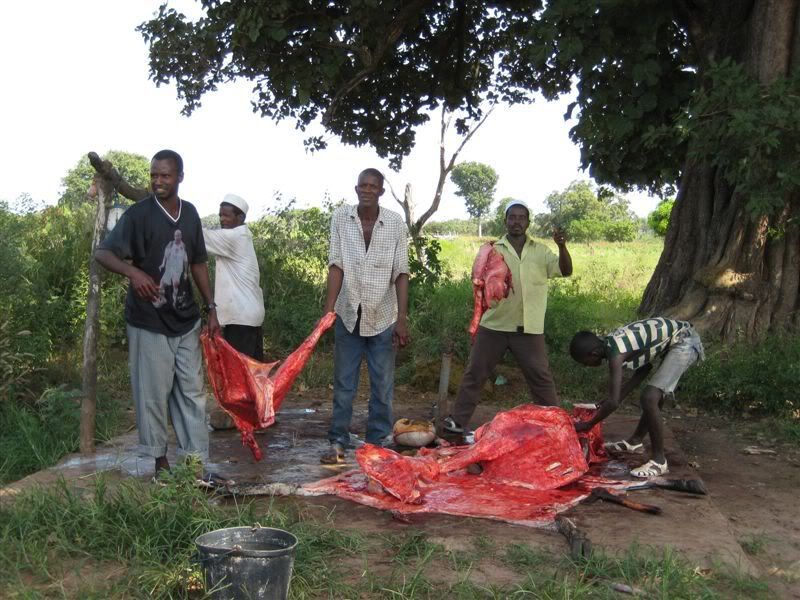
We got there right after this one was skinned. The guys loved that we were taking their picture.
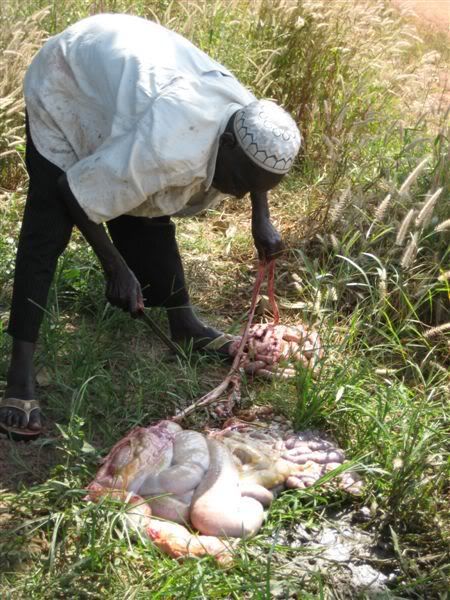
Cow intestines... Not exactly appetizing...
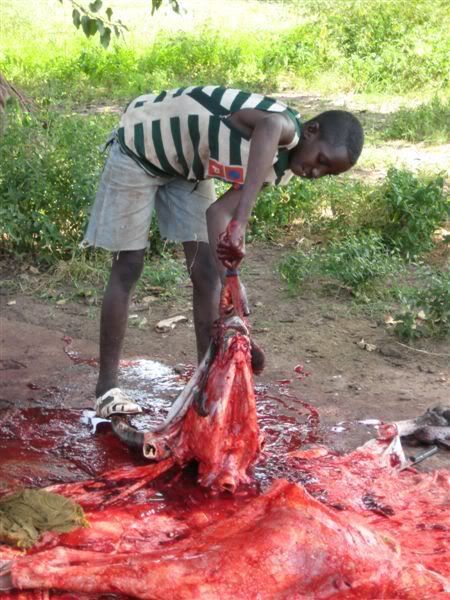
Yup, that's the head.
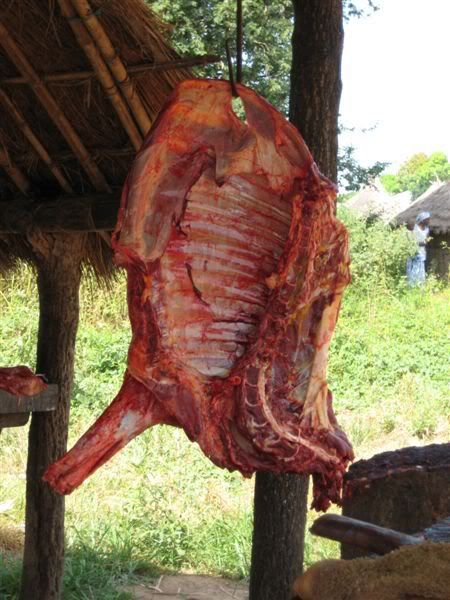
They kill the cow in one spot, then they carry the meat to this place to chop it up and sell it. This is one of the sides hanging up in the selling place so that they can cut it.
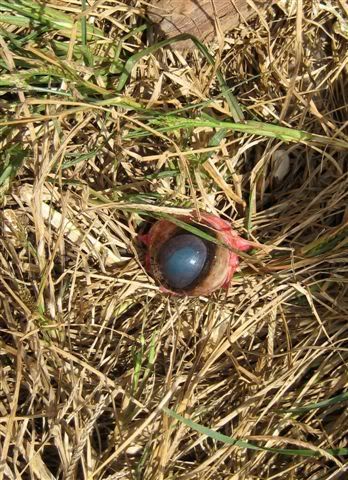
Yes, this is the eye of the cow that was tossed into the grass. Brings a new meaning to the whole idea of: "if your eye causes you to sin gouge it out and throw it away..."
The chicken and the cow were pretty normal, but did get a chance to eat some unusual food as well. Jason really wanted to shoot a monkey so we could eat that, but they didn't see any when they went out. Wednesday night Jason and a bunch of other guys went hunting for frogs in the rice paddy with machetés. They caught several and skinned and gutted them. The next day Gilson fried them and we ate them. They were good but hard to eat since they still looked like whole frogs without heads.
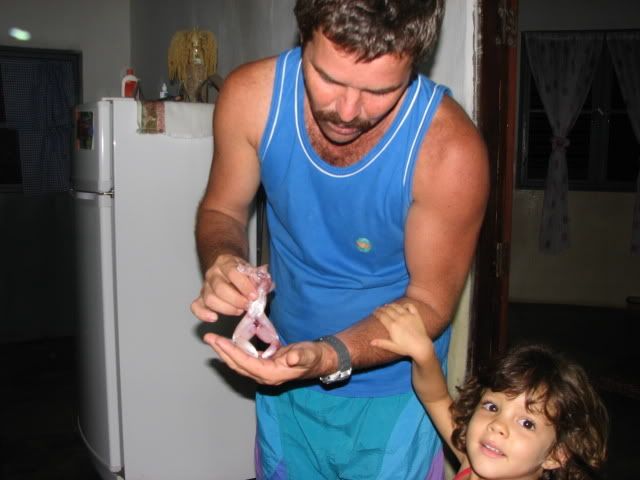
Before Gilson cooked it he was making it dance.
On Thursday some guys killed an iguana and brought it over. We bought the whole thing for around a dollar and then our neighbors cooked it and we ate some of it. The flavor was pretty strong, but not bad :)
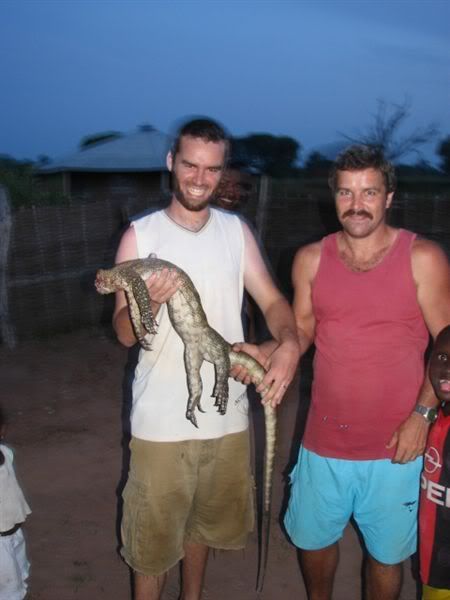
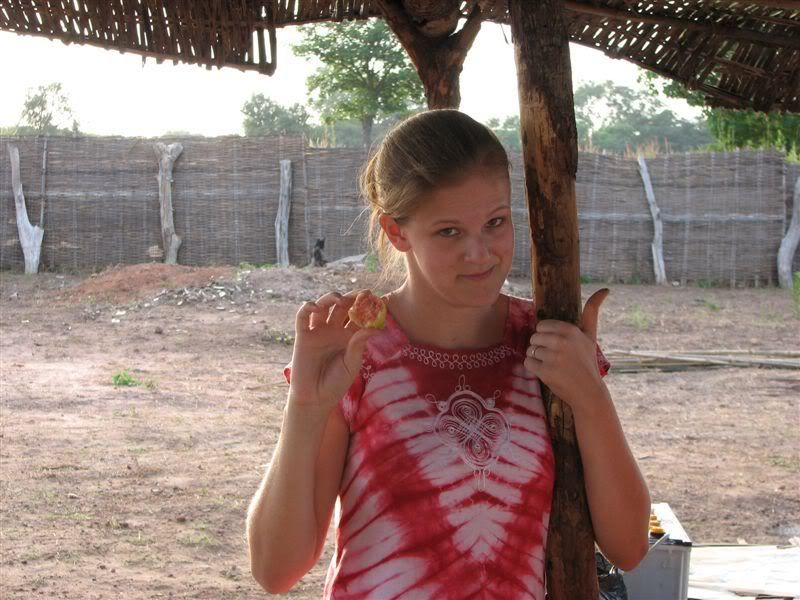
You really can't beat the fruit here. I am munching on a guava. Their taste is kind of similar to a strawberry.
The cucumbers in the village were huge! Erica and I were cutting some up for dinner and the idea for a spa in Sintchã Botchi hatched. What do you think?
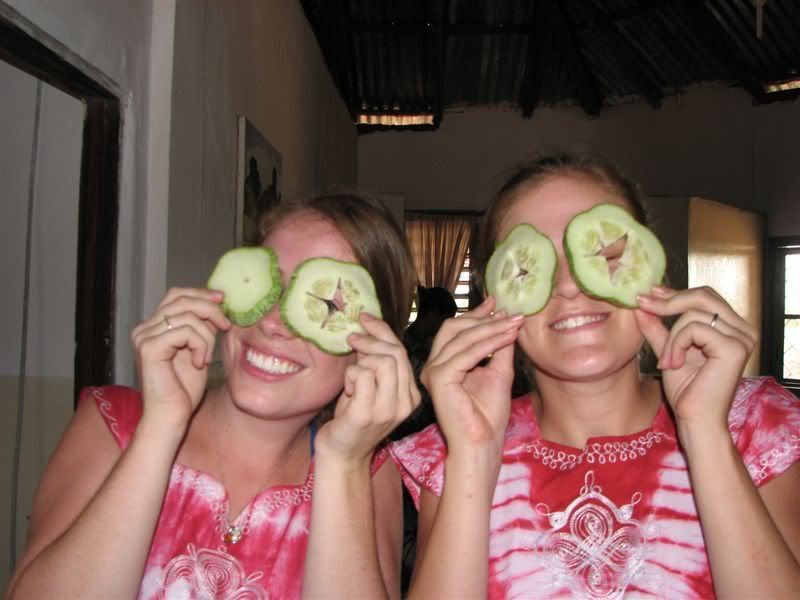
Another funny story happened Tuesday evening when we were cooking. I heard a splat and turned around to see a large, weird looking lizard that had fallen from the ceiling and was laying kind of dazed on the floor. I jumped a little which got Rosania and Erica's attention. They turned around and Rosania screamed so loudly that two guys who were sitting in the front yard came running in. Normally I wouldn't be that scared of a lizard, but Rosania kept screaming and yelling "kill it, kill it", and it was a little unnerving. The men grabbed some big sticks and with our help hunted it down and then hit it about 30 times, so I'm pretty sure it was dead. Later I found out that kind of lizard thing is venomous, so I guess it wasn't much ado about nothing after all :)
On Tuesday afternoon Rosania had Erica and I speak at a women's group she has been having. Some weeks two or three women are able to come, other weeks they might have a lot more. It just depends on whether the husbands feel like letting their wives go or not. I think only two or so of the women were Christians and there were about 15 there, so it was a great turn out. There were a few things that made it hard to communicate really well: one, we were speaking in Creole so we had to plan out all of the words beforehand; two, most of the women don't speak Creole well so everything we said had to be translated to Fula; three, there were lots of children there and the women didn't really do a lot to keep them quiet; and four, several of the women were topless, which is fairly normal in the village, but there is something about sitting next to a topless woman that you don't know that makes you feel a little weird.
One of the women who came to the meeting was named Binta. She and her husband are Christians and he is the only guy in the village that only has one wife and sleeps in the same house with her. He helps her with things and all of the other women in the village are jealous of her. Their marriage really is a great testimony to the people who know them.
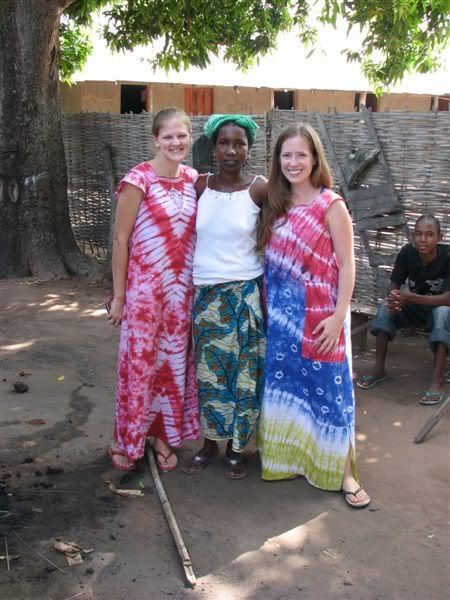
This is Binta with Erica and I on the day we left.
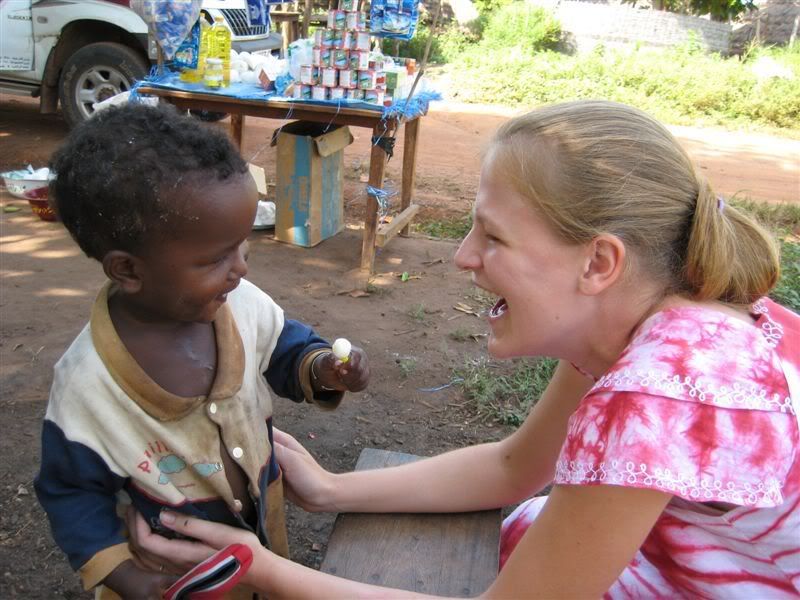
This little boy is Binta and Mamadu's youngest. His name is Mussa (Moses in Fula). He is laughing because he had just caught me by surprise and put his lollypop in my mouth...
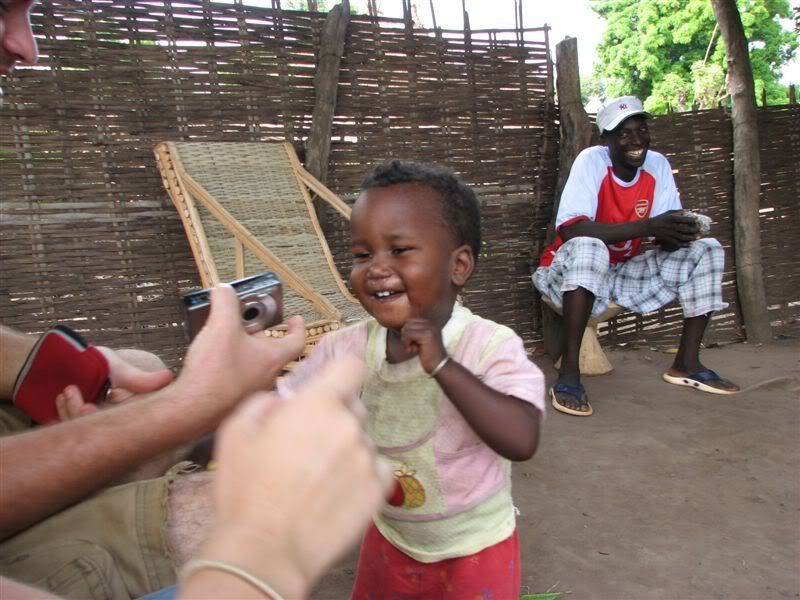
You can tell everyone is use to digital cameras because the first thing they want to do after you take their picture is see it. Mussa was pretty excited about the one Jase had just shown him.
It is really hard for a woman to become a Christian and most of them aren't as lucky as Binta. The lady sitting across from me on the stool is Kadijatu.
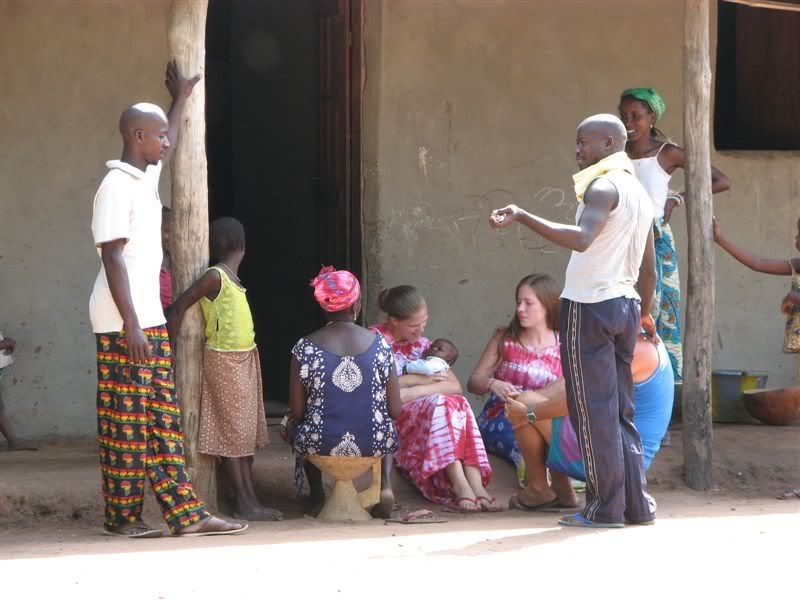
Her husband doesn't have a problem with her being a Christian because she is so happy but the other wives of her husband hate it. They are always telling her that she can't come to any funerals or marriages in the village because she is not a Muslim anymore. She has a new baby and she came to Rosania's house and was crying one day because the co-wives were telling her that her baby was going to die and she wouldn't be allowed to go to the funeral.
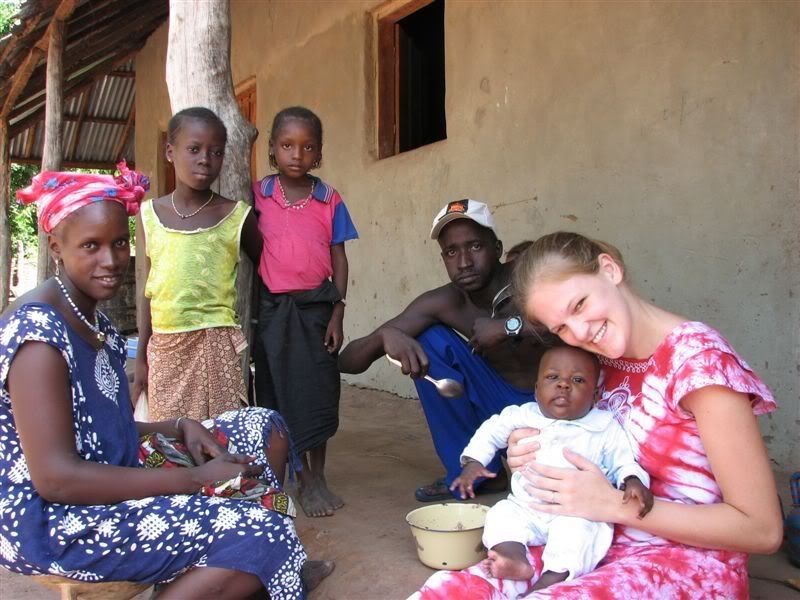
Most of the really little kids in village were afraid of us, but this one loved me! He is Kadijatu's youngest. The other children are hers too and I think that the guy is her husband.
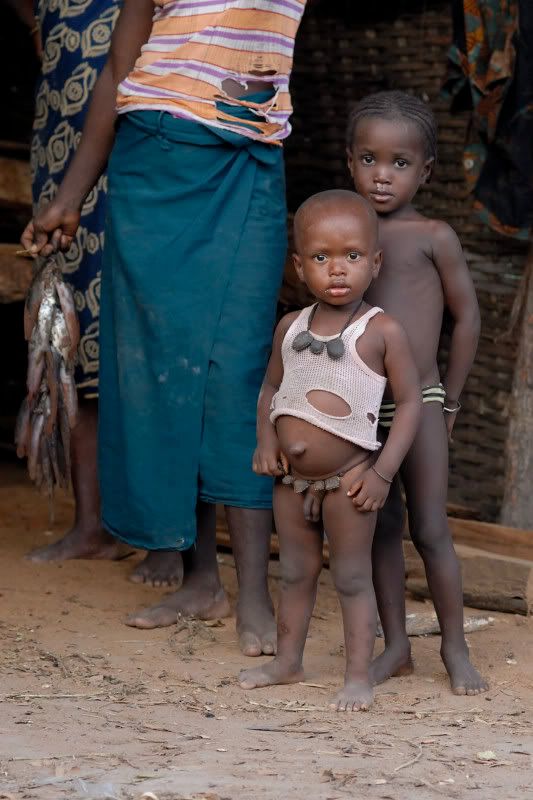
Most of the children wear necklaces and waist beads like this to keep evil spirits away, etc. Also pretty much all of the boys this age just wear a shirt, like him, or are totally naked. The lady in the background is holding some fish freshly caught from the river there.
On the way home we ran out of gas right before we got to the gas station while we were in Gabu. We had to get out and use some good old fashioned muscle to move the car. Unfortunately, Gilson stopped the car because he thought we had a gas can, but we didn't, so we were pushing from a stop. It was fine until we started going uphill. It was only Jason, Erica, Rosania, and I pushing at that point and we were not strong enough, so some men who were laughing hysterically at the "brankus" pushing a car came over to help us out.
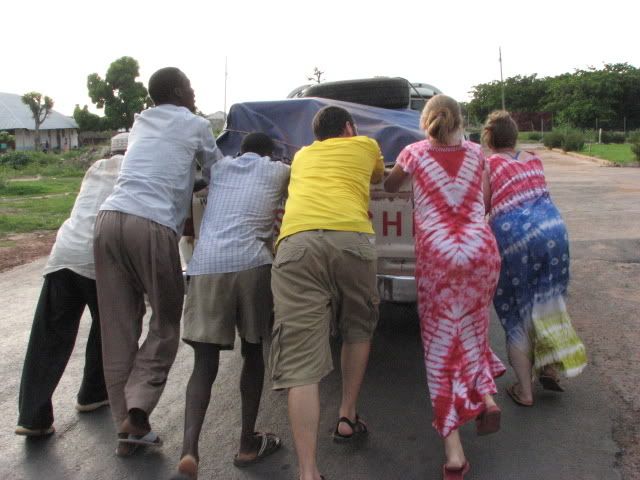
I hate to admit it but my hamstrings were sore for several days.
Ok, well if you made it to the end of this, congratulations. If you have any questions about the trip or you want to know more about any of my stories, let me know.


 .
. 